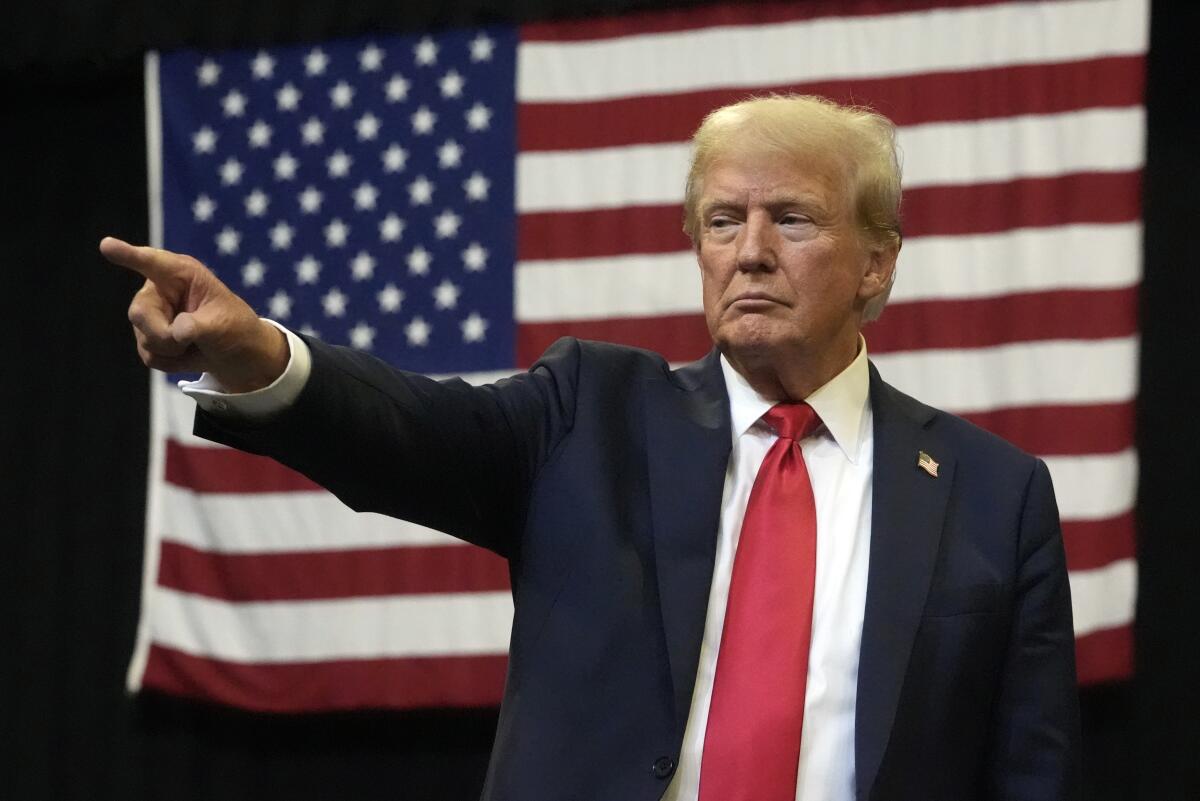Republican nominee and former President Donald Trump was elected as the 47th president of the United States early Wednesday morning, defeating Democratic nominee Vice President Kamala Harris. This will make Trump the second president to be reelected non-sequentially and the first president elected to be previously convicted of a crime — all in a historic, record-breaking and closely-contested 2024 election.
With a liberal reputation and a climate that some claim suppresses right-wing viewpoints, the Lafayette College community had mixed reactions to the election result, coming off an Election Day with overwhelming voter turnout.
“It feels nice to have a good result, after all this apprehension,” said Dimitri Chernozhukov ‘25, the president of the College Republicans. He said that he hopes to see Trump improve the economy and inflation come Inauguration Day.
“I think everyone should be a little less scared than they are,” said David Levchenko ‘25, who also voted for Trump. “We already had one presidency of Trump, and he didn’t really destroy America. I think everyone should kind of take a deep breath and enjoy the next four years.”
Along with Trump’s victory, Republicans will hold control of the Senate. The party will also likely have a majority in the House, according to projections as of Thursday morning.
Many students on campus were upset with the results. Some took to social media to express their support or grievances.
“I don’t want people to take the wrong lessons away from this,” said Jack Maloney ’25, the president of the College Democrats. “I don’t want people to turn to despair. I want people to mobilize.”
In Easton’s 3rd Ward 3rd District, which encompasses Lafayette’s campus and College Hill up to W. Pierce Street and Porter Street, 79.21% of voters cast a ballot for Harris compared to 20.23% for Trump. 71.8% of 124 voters in a campus survey by The Lafayette said that they would vote for Harris.
“I was hoping Kamala would pull it out, but it’s unfortunate,” Noah Ross ’27 said, giving a “kudos” to Trump for improving on the campaign trail this season.
“I’ve been very sad today,” Sonia Tenbarge ’28 said. “I’m pretty worried.”
With the two campaigns touting contrasting promises on abortion policies in a post-Roe v. Wade America, the issue lies at the forefront of many Americans’ minds. Abortion tied with the economy as the most important issue for The Lafayette’s election survey participants, who were mostly students.
Trump has made inconsistent claims about his views on abortion with a recent emphasis on leaving the decision to the state level. In the past, he has credited himself with overturning Roe v. Wade.
Students for Life of America chapter President Sidney Jones ‘27 emphasized that Trump is not “pro-life,” just less “pro-choice” than Harris, but that he would “be the best at handling pro-abortion policies.”
On Nov. 4, the day before the election, Students for Life hosted a speaker in front of Farinon College Center. Jones said that the chapter board has yet to discuss the election as a group, but that as a part of a national organization, they could not have endorsed a candidate.
“It is very scary,” said Rebekah Lazar ‘26, the president of Lafayette for Reproductive Autonomy, Justice, and Empowerment, also known as L-RAJE, of Trump’s election. “We’ve gone so far back.”
Lazar said that there have been positives for her organization this election cycle, such as increased abortion protection in states nationwide, and that L-RAJE looks to provide leadership and support on campus.
Queer students on campus have also expressed concerns.
“I am just one member of the queer community but I think it is safe to say that we are disheartened, afraid, and distressed by these outcomes,” President of OUT Lafayette Cate Cheng ‘25 wrote in an email.
Trump has notably focused recent election campaign advertisements on transgender issues. He has given historically contradicting statements about his support of gay marriage and transgender rights. However, his previous administration reversed policies meant to protect the bathroom usage of transgender students and implemented a ban on most transgender individuals from the military.
“The queer community has been here throughout history and we aren’t going anywhere,” Cheng wrote.
Trump’s re-election has also ignited some worries among international students.
Shawn Chew ’28, a member of the International Students Association, said that international students are “definitely fearful for the status of the country, whether or not they’ll be able to renew their visas.”
The former president has called to deport an estimated 12 million people with illegal residency from the United States. Throughout his first term, he called for a suspension of the country’s refugee resettlement program, a rolling back of temporary protected status designations for some countries and he wanted to tighten access to some visa programs, according to the Council of Foreign Relations.
“We don’t know what to hold on to now,” said Chew, who has had many individual and group conversations with international students. “And for people who don’t have citizenship here, I think there’s uncertainty for sure.”
Pennsylvania was considered a critical prize in this year’s presidential race. Both Trump and Harris visited Allentown, Pennsylvania, in the last week of their campaign. Northampton County lived up to its bellwether title and flipped red this election.
“In my view, no one really had a clear view of who would win the election before ballots were tallied last night; from that perspective, I was not particularly surprised by the outcome,” wrote Government & Law Professor Andrew Clarke in an email.
John Kincaid, also a Government & Law professor, echoed this.
“I was not surprised by the result,” he said. “I was just surprised by the size of the result.”
Kincaid characterized the election results not as a victory for Trump, but a loss for Harris.
“I think they failed to win because they failed to adequately realize that the election boiled down to the price of eggs and not Trump’s character,” Kincaid said of the Democratic Party. He also highlighted how Harris underperformed in demographics across the board compared to current President Joe Biden, such as with women and younger voters.
“When I was in elementary school, I thought that we would already have a female president in office,” Michaela Daly ’28 said. “It’s just hard to go another four years without a female as a representative for all of us.”
A correction was made on Nov. 11, 2024: A previous version of this article stated Republicans would hold control of the Supreme Court after the election. The composition of the Supreme Court is unrelated to the election outcome and it is a nonpartisan body, though it has a conversative supermajority.


























































































































DK • Nov 8, 2024 at 3:56 pm
Of course, everyone can have their opinions for president. However, it is disheartening when the focus is on identity politics rather than the salient issues. For example, voting for a candidate because they are a woman is not a qualification for being a US president. I thought ideas and policy were more important. The world is in conflict with illegals flooding into the country and inflation raging. BTW, abortion was not made illegal. The SCOTUS turned it back the states as consistent with the constitution. Now the states and the people can decide. People need to vote on REAL isues.
KN • Nov 9, 2024 at 12:15 pm
I couldn’t agree more